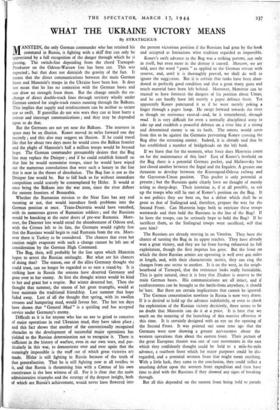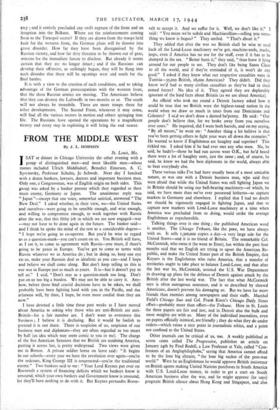WHAT THE UKRAINE VICTORY MEANS
By STRATEG ICUS
MANSTEIN, the only German commander who has retained his command in Russia, is fighting with a skill' that can only be appreciated by a full recognition of the danger through which he is
passing, The switch-line depending from the chord Tarnopol- Proskurov on the Odessa-Warsaw line has been cut. This was expected ; but that does not diminish the gravity of the fact. It means that the direct communications between the main German bases and Manstein's troops in the Ukraine have been lost. It does not mean that he has no connexion with the German bases and
can draw no strength from them. But the change entails the ex- change of direct double-track lines through territory wholly under
German control for single-track routes running through the Balkans. This implies that supply and reinforcement can be neither so secure nor so swift. If guerrillas do not win wars they can at least harry a retreat and interrupt communications ; and they may be depended upon to do that.
But the Germans are not yet near the Balkans. The nearness in space may be an illusion. Konev moved zo miles forward one day recently ; and this also may suggest an illusion. If he could travel like that for about two days more he would cross the Balkan frontier and the plight of Manstein's half a million troops would be beyond hope. The German commander presumably desires that the Bug line may replace the Dnieper ; and if he could establish himself on that line he would economise troops, since he would have wiped out the numerous convolutions that were such a luxury in the line that is now in the throes of dissolution. The Bug line is not as the Dnieper line would be. But to fall back so far without immediate compulsion could scarcely be contemplated by Hitler. It would at once bring the Balkans into the war zone, since the river defines the eastern frontiers of Bessarabia.
Whether the Rumanian mission to the Near East has any real meaning or not, that would introduce fresh problems into the German position at once. Trans-Dniestria would have vanished, with its numerous graves of Rumanian soldiers ; and the Russians would be knocking at the outer doors of pre-war Rumania. More- over, the Dniester line would entail the abandonment of Odessa and, with the Crimea left to its fate, the Germans would rightly fear that the Russians would begin to raid Rumania from the sea. More- over there is Turkey to be considered. The chances that even her caution might evaporate with such a change cannot be left out of consideration by the German High Command.
The Bug, then, will probably be the line upon which Manstein hopes to arrest the Russian onslaught. But what are his chances of doing that? The season, one of the allies Germany thought she could trust, can no longer be regarded as so sure a stand-by. It is striking how in Russia the seasons have deserted Germany and
gone over to her enemy. At first she thought winter would be kind
to her and grant her a respite. But winter deserted her. Then she thought that summer, the season of her great triumphs, would at least maintain the traditional friendship. Last summer that hope faded away. Last of all she thought that spring, with its swollen streams and hampering mud, would favour her. The last ten days have shown that "General Mud" is a quisling and has accepted service under Germany's enemy.
Difficult as it is for anyone who has no axe to grind to conceive of major operations in real Ukranian mud, they have taken place ; and this fact shows that another of the conventionally recognised obstacles to the development of successful major operations has yielded to the Russian determination not to recognise it. There is sufficient in the history of warfare, even in our own wars, and par- ticularly in this war, to demonstrate over and over again that the seemingly impossible is the stuff out of which great victories are made. Hitler is still fighting in Russia because of the truth of that generalisation. That he is still fighting now at all testifies to it, and that Russia is threatening him with a Cannae of his own contrivance is the best witness of all. For it is clear that the main administrative triumphs and the strategy of the deepest insight, both of which are Russia's achievement, would never have flowered into the present victorious position if the Russians had gone by the book and accepted as limitations what tradition regarded as impossible.
Konev's swift advance to the Bug was a striking portent, not only in itself, but even more in the dismay it caused. Moscow, we are told, uses the word " panic " as applied to the German retreat with reserve, and, until it is thoroughly proved, we shall do well to ignore the suggestion. But it is certain that tanks have been aban- doned in perfectly good condition and that a great many guns and much material have been left behind. Moreover, Manstein can be trusted to have foreseen the dangers of his position about Uman, and he can hardly have left merely a paper defence there. Yet apparently Konev punctured it as if he were merely poking a finger through a paper hoop. He swept forward towards the river as though no resistance existed--and, be it remembered, through mud. It is very difficult for even a normally disciplined army to take up and establish a powerful defence on a river line if a strong and determined enemy is on its heels. The omens would seem from this to be against the Germans preventing Konev crossing the Bug after the retreating enemy. Indeed, it is already said that he has established a number of bridgeheads on the left bank.
If we leave that for the moment, what force does Manstein count on for the maintenance of this line? East of Konev's foothold on the Bug there is a potential German pocket, and Malinovsky has just closed another between the Ingul and the Ingulets. A greater one threatens to develop between the Kirovograd-Odessa railway and the Gayvoron-Uman position. This pocket is only potential at present ; but the Russians quite clearly have no thought of merely acting as sheep-dogs. Their intention is, if at all possible, to cut up the troops who still lie east of Konev's position on the Bug. It is not politics they are bent on, but a defeat which shall be as great as that of Stalingrad and, therefore, prepare the way for the Second Front. Can Manstein hope both to extricate these troops westwards and then hold the Russians to the line of the Bug? If he loses the troops, can he seriously hope to hold the Bug? If he sacrifices them, as the Stalingrad troops were sacrificed, will that save him?
The Russians are already moving in on Vinnitsa. They have the chance of turning the Bug in its upper reaches. They have already won a great victory, and they are far from having exhausted its full exploitation, though the first impetus has gone. But the front on which the three Russian armies are operating is well over 40o miles in length, and, with their characteristic tactics, they can ring the changes from one sector to another. It is on the west, in the neigh- bourhood of Tarnopol, that the resistance looks really formidable. This is quite natural, since it is here that Zhukov is nearest to the main German bases. His communications are all intact, and if reinforcements can be brought to the battle-front anywhere, it should be here. But there are certain implications that cannot be ignored.
The German concentration nowhere in Russia is now very dense. If it is desired to hold up the advance indefinitely, or even to check the exploitation of the Russian victory decisively, there seems to be no doubt that Manstein can do it at a price. It is here that we touch on the meaning of the launching of this massive offensive at this time. It is certainly designed with an eye on the opening of the Second Front. It was pointed out some time ago that the Germans were now showing a greater nen ousness about the western operations than about the eastern front. Their picture of the great European theatre was one of vast movements in the east which they confidently thought could be held to a mile-by-mile advance, a southern front which for major purposes could be dis- regarded, and a potential western front that might mean anything. With a little luck, they came to the conclusion, they could inflict a smashing defeat upon the western front expedition and then have time to deal with the Russians if they showed any signs of breaking through.
But all this depended on the eastern front being held to parade step ; and it entirely precluded any swift rupture of the front and an irruption into the Balkans. Where are the reinforcements coming from to the Tarnopol sector? If they are drawn from the troops held back for the western front, the German plans will be thrown into grave disorder. How far they have been disorganised by the Russian victory, and how far they threaten to be thrown out of gear, remains for the immediate future to disclose. But already it seems certain that they are no longer intact ; and if the Russians can develop their offensive, so strikingly begun, they will be flung into such disoider that there will be openings west and south for the final battles.
It is with a view to the creation of such conditions, and to taking advantage of the German preoccupations with the western front, that the three Russian armies are moving. The Americans believe that they can destroy the Luftwaffe in two months or so. The south will not always be immobile. There are more troops there for Other developments. The Second Front, whenever it may come, will find all the various sectors in motion and others springing into life. The Russians have opened the operations by a magnificent victory and every step in exploiting it will bring the end nearer.



























 Previous page
Previous page